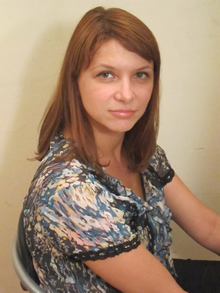Mariya Komolova

Associate Professor
English
EMAIL: mkomolova@bmcc.cuny.edu
Office: N-651R
Office Hours:
Phone: +1 (212) 220-8000;ext=5272
Masha Komolova received her B.Sc. in Psychology at Hunter College, and her M.Sc. and Ph.D. in Developmental Psychology at the University of Utah.
At BMCC, Prof. Komolova is one of the faculty advisors for the Psychology Club, and an instructor in the BLA learning communities.
Expertise
Narratology, Cognitive Development, Child Development and Learning, Adolescence
Degrees
Courses Taught
- The course introduces students to the scientific study of behavior and mental processes. Students will learn about current perspectives, historical roots and scientific methods in psychology. Topics within major areas of psychology may include biopsychology, human development, learning, cognition, social processes, personality and psychological disorders.
- This course explores biological, cognitive, and emotional growth from conception through adolescence. Attention is paid to the interplay of individual and sociocultural factors that influence the course of psychological development. Prerequisite: PSY 100
- The course introduces students to major theories and scientific findings in social psychology emphasizing personal and situational behavior. Research and application in the areas of social thinking, social influence and social relations are discussed. Topics include, but are not limited to, attitudes and beliefs, conformity, prejudice, group behavior and leadership, communication and persuasion. Prerequisite: PSY 100
- This course explores cognitive, emotional, and behavioral changes across the lifespan. Attention is given to how biological sociocultural factors shape the individual. Prerequisite: PSY 100
- The course is designed to introduce the students to psychological research. Students will learn about the research process by analyzing the ethical issues in research, conducting literature reviews, collecting, analyzing and interpreting the data, as well as summarizing and presenting the findings. Students may be presented with an opportunity to work with faculty on designing and implementing a research project. The course includes both theoretical and applied (lab) components.
Prerequisite: PSY 100 and two PSY 200-level courses - The course will examine theoretical and methodological approaches and challenges to studying the impact of culture on psychological processes and how people construct cultural meaning. Topics may include: definition and methods of cultural psychology, self and identity, motivation and emotion, cognition and perception, morality, mental health, and migration and cultural assimilation. Implications of cultural psychology for social policy and clinical practice will be discussed. Prerequisite: PSY 100
Research and Projects
- Prof. Komolova’s research interests focus on how autonomy and identity development vary across interpersonal and cultural contexts. She is also interested in how narrating about interpersonal experiences reflect and further facilitate youth?s socio-cognitive development.She is currently collaborating with Prof. Foust on the project that examines how young adults make sense of their sexual experiences, and how these experiences relate to their autonomy development.
Publications
- How violent youth offenders and typically developing adolescents construct moral agency in narratives about doing harm.2009, Narrative development in adolescence
- “Things like that happen when you come to a new country”: Bosnian refugee experiences with discrimination2018, Qualitative Psychology
- “I want her to make correct decisions on her own”: Former Soviet Union mothers’ beliefs about autonomy development2018, Frontiers in Psychology: Cultural Psychology
- Children’s and adolescents’ conceptions of personhood: A narrative approach2016, International Journal of Behavioral Development
- Childrenâs narrative accounts and judgments of their own peer-exclusion experiences2014, Merrill-Palmer Quarterly
- “What I want and what you want”: Children’s thinking about competing personal preferences2011, Social Development
- “She had a reason to be concerned”: Youth making sense of their mothers’ and friends’ perspectives in their accounts of conflicts2017, Cognitive Development

